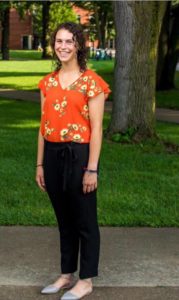With fall approaching, the autumn chill signifies the beginning of baggy knit sweaters, pumpkin-flavored desserts and standardized testing. The test looming over the heads of many pre-med Grinnell fourth-years, and possibly third-years, is the notorious Medical College Admission Test (MCAT) exam needed to apply for medical school.
Gwen Holtzman ’19, a chemistry and Spanish double major, is currently studying for the MCAT that she plans to take in January. She’s currently taking 12 credit hours at the College instead of the typical course load of 16 in order to use the remaining time for MCAT studying. “With those extra, essentially, time slots a week, I hit ten hours a week at least … I actually go to Saints Rest two times a week and do three-hour chunks.”
On the other end of things, Joy Suh ’19, a biochemistry major, has already completed the MCAT. Joy used resources such as Khan Academy and the fee-assistance program to study for the exam in April. “If you qualify for the fee-assistance program, … it helps a lot ‘cause they give you free study materials like official study materials and practice tests.” Suh said.
The MCAT can be a serious source of pressure on the students taking it due to its weight in the medical school application process. Holtzman noted the stress of the competitive nature of the medical school application process.
After Suh took her exam in April, she had to take a step back from thinking about the MCAT all the time. “I didn’t touch anything related to med school, I didn’t look up things, I didn’t think about my test at all, I just had this breather break, but that might be hard for some people if you’re taking it and going to apply right after,” Suh said.
Aside from the stress of taking the MCAT, the test also carries serious financial implications. “Applying for medical school in itself is really inaccessible … The MCAT itself is like $350 to take, the applications, they all have a primary fee, they all have a secondary fee and you have to fly out to your own interviews,” Suh said.
When asked about what the financial implications of the MCAT were for her, Holtzman responded, “It’s definitely something that is going to come into play. So I’m taking my first practice exam during fall break, so the question is, if I perform, let’s just say, ‘poorly,’ then do I push back the test date? Because, unlike the ACT, you don’t just take it again.”
Despite these stressful barriers and burdens, both students affirm that College has adequately prepared them for the both the exam and the stress accompanying it. “Grinnell science classes are really hard and you won’t realize it until you start to study … I wasn’t having to teach myself things; it was more just reviewing things that I had already learned. So Grinnell does a really good job,” Suh said.
Although both students plan on taking gap years, both have plans in mind for their future medical careers. Holtzman is interested in going into emergency care or obstetrics and gynecology (OBGYN) in her future. When asked why she wants to be a doctor, Holtzman responded, “I think it’s something that I’ve always really wanted to do … I love interacting with people. It’s the reason I’m a Spanish major … I want to be able to communicate with people specifically in the U.S., it’s so diverse.”
Suh has plans with Americorps during her gap year before heading off to med school. After med school, Suh plans to combine her interests in social justice and medicine. “I’m from rural Oklahoma. I want to work for underserved populations, so I want to either start my own non-profit clinic … or I would want to do gynecology or something and maybe work for Planned Parenthood.”


Top Photo Contributed, Bottom Photo by Rylee Dole















































